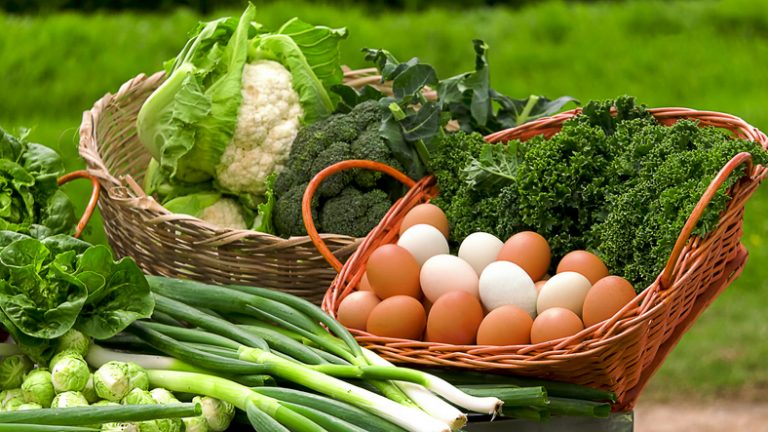How Your Diet Helps To Build Strong Bones
Osteoporosis is a risk at menopause so to keep your bones strong and healthy these foods are essential.

Being healthy as we age means taking care of our bodies and having strong bones is a key part of staying fit and well.
If you have any history of osteoporosis or osteopenia, and want to stay that way, then make sure you include these key dietary elements.
1. Darker green for better bones
A key element for strong bones is calcium, but most of us think that has to come from dairy. Not true, as it’s also found in lots of vegetables.
Best sources are dark leafy greens such as bok choy, Chinese cabbage, kale, broccoli, Brussel sprouts, cabbage, cauliflower , turnip greens and kohlrabi.
We usually buy turnips without their green leafy tops but one cup of cooked turnip greens has about 200 milligrams of calcium (20% of your daily goal).
Another benefit is that dark greens also have vitamin K, which can reduce your risk for osteoporosis.
2. Make your potatoes sweet
Two essential nutrients that help keep bones healthy are magnesium and potassium. If you’re low on magnesium, you can have problems with your vitamin D levels, which may affect your bone health.
Potassium neutralises acid in your body that can leach calcium out of your bones. One excellent way to get some of both of those nutrients is by eating a baked medium-size sweet potato with no salt, which has 31 milligrams of magnesium and 542 milligrams of potassium.
3. Grab a grapefruit
Add a grapefruit to your breakfast and you’ll be doing more than waking up your taste buds. Citrus fruits have vitamin C, which has been shown to help prevent bone loss.
Red and pink varieties generally offer more Vitamin A, and red grapefruit may provide greater health benefits for cholesterol and triglyceride reduction due to higher antioxidant content.
4. Fig benefits
Fresh or dried, they are both good sources for your strengthening your bones.
Five medium fresh figs have around 90 milligrams of calcium and other essential nutrients like potassium and magnesium.
5. Fatty fish
Salmon and other types of fatty fish offer an array of bone-boosting nutrients. They contain vitamin D, which helps your body use calcium, and omega-3 fatty acids, which may also aid bones.
It does not have to be fresh salmon either as in three ounces of tinned salmon there is 197 milligrams of calcium.
Why such a high amount? Small, soft bones get included with the meat in the canning process and if you mash the whole together with a fork you will get the extra benefit.
6. Almond butter
Almond butter can be a better choice for your bones than peanut butter due to its higher content of monounsaturated fats, vitamin E, and magnesium, along with more fibre and calcium, while having less saturated fat.
Two tablespoons has 112 milligrams of calcium. Plus, almonds contain potassium (240 milligrams in 2 tablespoons) as well as protein and other nutrients that play a supportive role in building strong bones.
7. Alternative milk sources
You’d think that by swapping out dairy milk for the kind made from oats, soybeans, almonds or coconuts, you’d lose all that calcium and vitamin D.
However if you check the labels then you will find that most of the varieties in the supermarket or health store will have been given an extra boost of those nutrients.
However, it is a good idea to check that they do not contain any additional ingredients such as sugar.
8. Boost vegetarian protein intake
Tofu is a mainstay in Asian cooking, both for its versatility and the fact that it’s a nutritional powerhouse. Half a cup of calcium-enriched tofu contains more than 800 milligrams of calcium.
Tofu has other bone-building benefits too as research suggests that isoflavones, which are plentiful in tofu, may make soy useful in warding off bone disease in women after menopause.
9. Prune power
They are mostly known for the ability to help keep you regular, but they are a healthy addition to your diet.
Prunes are just dried plums (if that helps you see them differently) and research has found that eating them every day, along with calcium and vitamin D, can help improve your bone density by slowing the breakdown of bone in your body.
10. Swap sugar or sweeteners for molasses
Unlike refined white sugar, molasses is a source of calcium and has none of the drawbacks of sweeteners.
In just 1 tablespoon of molasses you’ll get 41 milligrams of calcium and although it is lower in calories than honey, it is still a form of sugar, so do monitor your intake if watching your weight.
Helpful information:
The fear of having brittle bones, which is what osteoporosis is, can be a real challenge at menopause and beyond.
Bioidentical natural progesterone has been used for many years worldwide to treat osteoporosis. In the process of bone rebuilding, it is oestrogen that slows down breakdown of the old bone, but it is progesterone that is essential to build new bone.
Known as ‘the silent killer’ because you don’t usually know you have it until after you have had broken bones, taking preventive action is much the best policy.
As well as hormone balance, these helpful foods remember that weight bearing exercise is also vital.
This article will also give you some more information on the condition.
https://anna.blog.wellsprings-health.com/osteoporosis-a-doctors-view/


















